Skyrim Remastered: Bethesda's Impossible Task
We dig into Skyrim Special Edition and examine what makes Bethesda's RPG so compelling... and so controversial.
This article first appeared on USgamer, a partner publication of VG247. Some content, such as this article, has been migrated to VG247 for posterity after USgamer's closure - but it has not been edited or further vetted by the VG247 team.
When Skyrim Remastered dropped last week, I was among those who immediately loaded it up. It wasn't out of a desire to finally finish Bethesda's massive RPG, which in any case has a pretty disappointing ending. I just wanted to hang out in Skyrim.
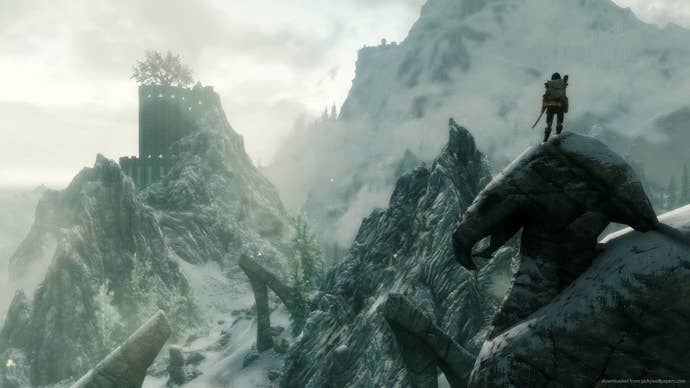
Yes, I'm a fan of Bethesda's RPG-a position that might be controversial among harcore RPG fans. After all, few RPGs are as reliably controversial as Skyrim. Ever since its initial release back in 2011, fans have debated Bethesda's design choices and complained about its failings.
"They should have remastered Morrowind," a friend of mine grumbled shortly after it emerged that Bethesda would be remastering Skyrim of the Xbox One, PlayStation 4, and PC. He certainly wasn't alone in his opinion.
And to some extent, the detractors have a point. For all of its promises of being a vast, open-ended experience, Skyrim's seams can be frustratingly apparent: key characters are invincible, choice is often an illusion, and there are so many bugs. Seriously, don't even get me started on the bugs.
But yet, here I am.
The release of Skyrim Remastered last week reopened the book on a flawed but also unique RPG-one that has in one way or another captured the imagination of millions of players. How else to explain its continued relevance five years after its original release? You could say "mods," but if Skyrim didn't have at least some merit, then the modding community have never appeared.
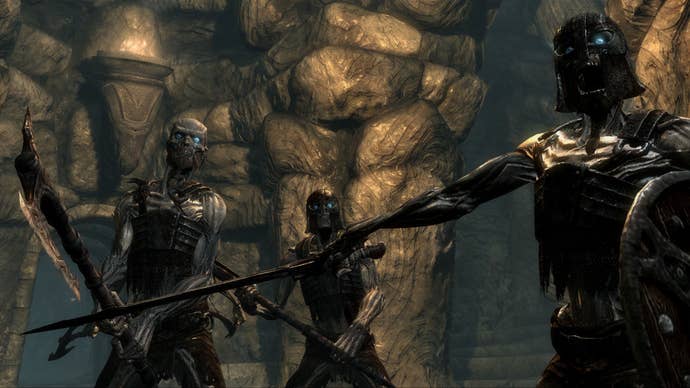
No, aside from its name recognition, Skyrim's main strength is that there just isn't a lot like it. Few publishers have the resources and technical chops to make a game like Skyrim; and out of those developers, almost none have tried to emulate Bethesda's approach. Even Witcher 3, which is a phenomenal open-world RPG by any measure, casts you as an established character, which makes it feel like more of a movie than a living, breathing universe.
As with Fallout, I find that Skyrim scratches an itch that other RPGs can't quite reach. I was reminded of that earlier today when I jumped into Skyrim: Special Edition and revived my two-year old character-a female nord dressed like a ninja who also happens to be able to transform into a werewolf. It's pure, silly roleplaying-the stuff of every Mary Sue D&D character ever-but it's hard to deny how fun it is to prowl through Riverwood terrorizing the townsfolk.
Such moments lie at the core of the appeal of the Elder Scrolls series, and they have their roots in Bethesda's desire to go as big as possible in depicting an interactive fantasy world. Consider Daggerfall-the second main game in the series-which was purported to feature a landmass the size of Great Britain. For the mid-90s, it was a very impressive achievement, and Daggerfall still ranks among the largest games ever made. Of course, Daggerfall's scope also got Bethesda into trouble, as it was both much-delayed and ultimately very buggy, but that in some ways comes with the territory with any large open world game. Its biggest flaw, ultimately, was that it was too big for its own good, making it visually monotonous while limiting it too all but the most powerful computers of the era. But it spoke to what Bethesda was trying to accomplish with their RPGs.
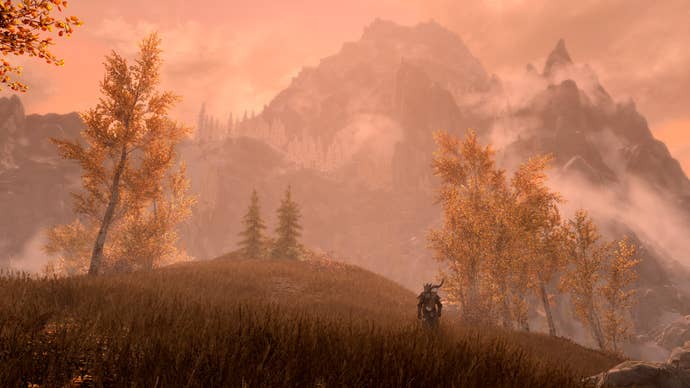
In the years since, Bethesda has steadily refined their formula, sanding down the edges and making it more cinematic and accessible with each successive release. Of them all, Morrowind is probably the best loved, in part because it was the game where the series really started to come into its own. It was much more diverse and interesting to explore than Daggerfall or even Oblivion, its smaller scope allowing for more hand-crafted dungeons, and it introduced many of the systems that would continue into the later games. It was also where the franchise's signature free-form exploration really emerged, and the world it portrayed really began to feel alive.
In a way, it was a throwback to the earliest days of the genre, when quests were limited only the imagination of the Dungeon Master. Indeed, while promoting Morrowind, director Todd Howard told IGN, "The goal of every TES game is to create something that resembles a pen and paper RPG on the computer."
That's as succinct a summation of Bethesda's vision as I've found; and flaws aside, Skyrim is probably the best realization of that dream so far. Its starkly beautiful landscapes make you want to put aside fast travel just so you can admire the scenery, and its every corner seems to harbor an interesting secret to discover. Moreover, it's striking just how epic it all feels. You probably remember how overwhelmed you felt the first time you saw a dragon, or what it was like to climb the Throat of the World and look down upon Skyrim amid a worsening blizzard. Even the combat, while still kind of stiff, has its moments, especially when you strike a mortal blow and one of the animations kick in.
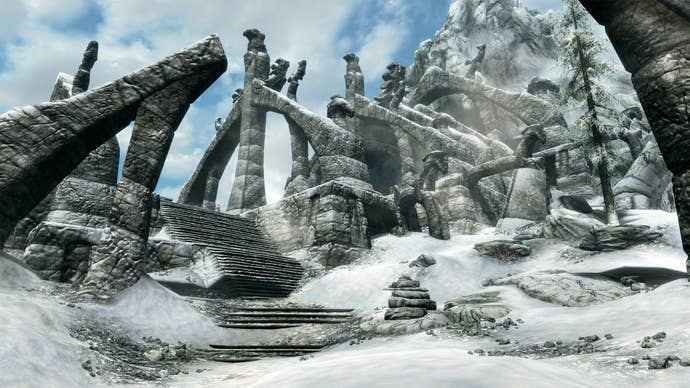
But mostly, it's just fun to explore. It's a real delight the first time you figure out how to get the Dark Brotherhood to appear, or you get to try and be a werewolf. Such moments have pushed me to all but abandon the main quest and strike out into the world at large to see what it has to to offer. Right now, my main desire is to save up enough money to buy the biggest house in Solitude so that I can settle down with my werewolf wife. To me, that's the purest form of roleplaying you will find a single-player game.
Bethesda seems to agree. Since Oblivion, the story in Elder Scrolls (and Fallout) has increasingly become window dressing-a reason to get you out exploring. There is an endgame, but its less important than interacting with the world and steadily growing your character. The drawback of this approach is that it turns off more story-focused fans, and that it puts that much more pressure on the game to be amazing: when you're supposed to be totally immersed in a beautiful fantasy world, you're less apt to forgive a dragon getting stuck in a building or a radiant action going awry.
Even with this approach, Bethesda isn't totally immune from criticism in their handling of Skyrim's story. In putting more emphasis on cinematic dragon fights and their overall presentation, they seem to want to placate fans who prefer story to raw exploration. But if that's the case, then they should stop trying to force players to choose between factions, as they do in both Fallout 4 and Skyrim. They'd do well to follow the example of their own Far Harbor DLC, which lets you take a number of approaches to solving a regional conflict (I nuked them). What drives people to Skyrim and its ilk is the feeling of limitless possibilities; that you can go anywhere, do anything, and be anybody. Start limiting their options and they'll get grumpy, even if you're doing so in the service of telling a compelling story.
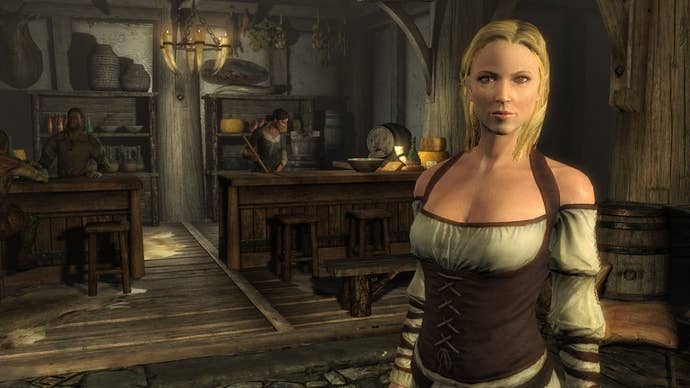
Then again, Bethesda has also taken on a nearly impossible task: trying to make a giant open-world RPG that lives up to the standards of a triple-A blockbuster. They want to be all things to all people, hardcore fans and mass market gamers alike, but there are always tradeoffs when designing a game as big as Skyrim. Managing game development is all about where you want to put your resources, and those massive, cinematic dragon fights no doubt came at the expense of all kinds of interesting systems. And telling a sweeping, epic story can be easier said than done in a game with so much freedom of action.
Still, even knowing Skyrim's flaws, I feel right at home in its world, even five years later. Dark Souls has better combat, and Witcher 3 has a better story, but Skyrim's world is the one I want to live in. That's a pretty amazing base to build a game on, and the single biggest reason that I find myself falling for Bethesda's RPGs time and again. We'll see what Nadia has to say about Skyrim: Special Edition's actual merits as a remake in her upcoming review.
But regardless of how you ultimately feel about Skyrim, there's always mods, right?









